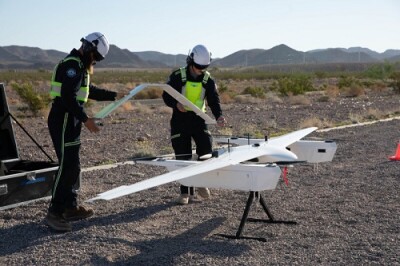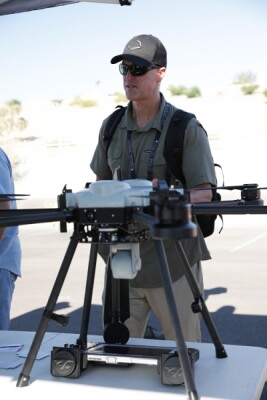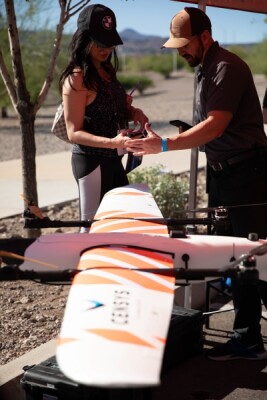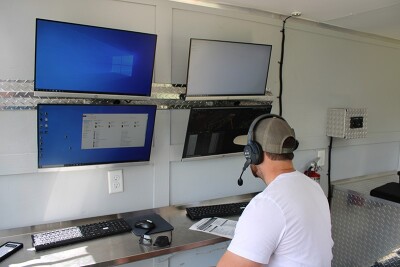Given recent trends and reports, it’s safe to say that the commercial drone sector will continue to grow in the years to come—and that means that opportunities for drone pilots will continue to expand.
 That’s great news for people looking to get a start in the commercial drone field or move ahead in their careers as operators, but many industry insiders warn that simply being a proficient pilot is not enough to ensure professional success. For example, a recent article in sUAS News looked at the many ways drone pilots can struggle in their chosen field. The piece said that some pilots have difficulty staying on top of the constantly changing regulatory environment, complying with federal, state, and local rules, and adapting to technological advances.
That’s great news for people looking to get a start in the commercial drone field or move ahead in their careers as operators, but many industry insiders warn that simply being a proficient pilot is not enough to ensure professional success. For example, a recent article in sUAS News looked at the many ways drone pilots can struggle in their chosen field. The piece said that some pilots have difficulty staying on top of the constantly changing regulatory environment, complying with federal, state, and local rules, and adapting to technological advances.
Other challenges facing drone pilots concern the acquisition of specific industry expertise. It’s important to keep in mind that many companies are looking for people who are subject-matter experts first and drone pilots second.
“To become a successful commercial drone pilot in the current marketplace, a remote pilot needs to develop subject matter expertise in one or more core disciplines beyond just operating the aircraft and managing the data,” Chris Todd, Executive Director, AIRT/DRONERESPONDERS, told Commercial UAV News. “Employers or customers are looking for operators who are certified to operate UAS, but also truly understand their core business,” he said. “Whether it is photojournalism, critical infrastructure inspections, constructions, or public safety, you need to have a solid knowledge foundation in the sector you are working in if you truly want to be successful.”
 Despite the challenges, Zacc Dukowitz, a contributing writer for Commercial UAV News and UAV Coach, believes that now is a good time to go into the field. “From a cultural perspective, things have gotten easier for drone pilots,” he said. “Both for drone pilots within large organizations and for freelancers, there isn't as much of an uphill battle to make the case for the value drone services can provide. Though, to be sure, there is still internal pushback that has to be overcome—it's just not as strong as it used to be.”
Despite the challenges, Zacc Dukowitz, a contributing writer for Commercial UAV News and UAV Coach, believes that now is a good time to go into the field. “From a cultural perspective, things have gotten easier for drone pilots,” he said. “Both for drone pilots within large organizations and for freelancers, there isn't as much of an uphill battle to make the case for the value drone services can provide. Though, to be sure, there is still internal pushback that has to be overcome—it's just not as strong as it used to be.”
Given these opportunities—and challenges—here’s a look at 5 Steps to Drone Pilot Success:
Step One: Get a License
The first step to becoming a commercial drone operator is to get a license to fly. If you don’t complete Step One, don’t even bother going on to the next steps!
In the United States, commercial drone pilots must get a Remote Pilot Certificate, commonly known as a “Part 107” license. Fortunately, getting your Part 107 is relatively simple. You must be at least 16 years old, be able to understand, read, write, and speak English, be mentally and physically able to operate a UAV safely, and pass the "Unmanned Aircraft General – Small (UAG)" aeronautical knowledge exam. This test covers a wide range of issues including regulations, classifications, flight operations, emergency procedures, communications, night operations, and more.
The FAA has published a wealth of information about obtaining your commercial drone operator license under Part 107, including a list of study materials.  In addition, there are many training programs available across the US to help you prepare for your Part 107 test. A simple online search should turn up a number of in-person courses in your area, as well as internet-based courses.
In addition, there are many training programs available across the US to help you prepare for your Part 107 test. A simple online search should turn up a number of in-person courses in your area, as well as internet-based courses.
Licenses are also required for commercial drone operators in other parts of the world. For example, Australian drone pilots must undergo Remote Pilots Licence (RePL) training. An RePL is a certification issued by the Civil Aviation Safety Authority (CASA) that allows you to operate drones on a commercial basis. In Europe, specific certifications for commercial drone operators are required under regulations from the European Union Aviation Safety Agency
Step 2: Get Some Training
As mentioned in Step 1, training is essential for pilots looking to get a license and launch a career. But ongoing training and specialized education are also important for pilots looking to fill specific roles and move ahead.
Writing in Commercial UAV News earlier this year, Richard Nelson of Airbotics Talent and DroneZone said that hiring and retaining talent are among the business challenges facing the drone industry. “Finding qualified professionals with experience in developing, operating and maintaining fleets of UAV is proving challenging,” he reported. “Hiring and retaining the talent in emerging tech markets is always painful. Inherently, you will always be working within the parameters of there being greater demand than supply and this can be a daunting place to be. Unlike commercial aviation, there isn’t the depth or maturity of skills in the market and the talent pool businesses end up fishing from is more of a puddle than a pool.”
To address these issues, large universities, community colleges, and even high schools are offering specialized training programs. For example, Warren County Community College (WCCC) President Will Austin told Commercial UAV News that expansion in the advanced air mobility sector is increasing the demand for skilled pilots, and his school is adding programs to meet that demand. Austin asserted that as the drone industry becomes more of a “merged industry” involving artificial intelligence, programming, and voice recognition, educators will need to focus more on “robotic build and development.”
 Over the past year, many schools and companies have followed WCCC’s lead in increasing their educational offerings for drone pilots. Among them are Greeley, Colorado’s Aims Community College, which now offers an associate degree in drone operations and engineering. Students at Aims can take part in a two-year, 43-credit program that provides instruction on operating drones beyond visual line of sight, instruction on safety management for the collection and delivery of sensitive data, and UAV design and construction.
Over the past year, many schools and companies have followed WCCC’s lead in increasing their educational offerings for drone pilots. Among them are Greeley, Colorado’s Aims Community College, which now offers an associate degree in drone operations and engineering. Students at Aims can take part in a two-year, 43-credit program that provides instruction on operating drones beyond visual line of sight, instruction on safety management for the collection and delivery of sensitive data, and UAV design and construction.
Similarly, Virginia Tech launched a program this past year that enables students to earn a certificate from the United States Geospatial Intelligence Foundation (USGIF). The certificate will help students launch careers in national security and intelligence using geospatial data analysis—areas that rely heavily on UAS technology.
Along with colleges and universities, many private training companies are offering specialized coursework. For example, SkyOp LLC provides courses on flight training and drones in public safety. The USA Drone Academy offers courses on drone surveying, drone repair, and using uncrewed systems for photography. And, through Public Safety UAS, students can focus on drones in law enforcement operations.
Ambitious drone pilots are encouraged to seek out these training opportunities and gain the skills and knowledge needed to advance their careers. As Dukowitz stated, “No change will come overnight, and so long as you're educating yourself and staying on top of new technology, you'll still have work.”
 Step 3: Get a Sense of the Opportunities
Step 3: Get a Sense of the Opportunities
Depending your level of experience and where you choose to live and work, professional drone industry opportunities can vary widely. Also, different experts have different views on what areas have the greatest potential for growth.
Still, there are many professional opportunities for qualified drone pilots—you just have to know where to find them.
A good way to explore opportunities is to check out the many professional groups that focus on the UAV industry. The Association for Unmanned Vehicle Systems International (AUVSI) presents job postings, as does Women and Drones. In addition, you’ll often find job postings and networking opportunities on the Commercial Drone Professionals LinkedIn page.
Another great way to investigate drone industry resources is to attend a major industry event, such as the annual Commercial UAV Expo. Held in early September each year in Las Vegas, the Expo brings together drone companies and industry leaders from around the world and presents unlimited opportunities for networking and career advancement. For example, the 2023 Expo included a dedicated “Level Up Lounge” where professionals could get career advice, meet with prospective employers, and even take a new “headshot” for their resume and portfolio. What’s more, last year’s event included sessions and workshops aimed at career development, including Drone Pilot Opportunities and Operations.
Step 4: Get Ahead of the Competition
As Chris Todd from AIRT/DRONERESPONDERS told Commercial UAV News, “It is easier than ever before to become a commercial drone pilot, but much more challenging than most people anticipate to make a successful career out of it. You really need to focus on becoming a subject matter expert in a specific sector if you want to position yourself to succeed.”
Zacc Dukowitz agrees. “For now, my advice would be to just be really good at what you currently do in the drone industry and learn new technology as it comes out so long as it's relevant to the field in which you currently work or the one you want to work in,” he asserted. “If you work in inspections, learn about the solutions that top inspectors are using. Go to conferences, network with colleagues, and stay on top of emerging trends.
 With this in mind, a great way to get ahead of the competition is to add “drone pilot” to your already solid industry resume. For example, if you work in the surveying and mapping field, establish your core industry expertise, then learn to fly a drone, get the appropriate license, and look for new opportunities.
With this in mind, a great way to get ahead of the competition is to add “drone pilot” to your already solid industry resume. For example, if you work in the surveying and mapping field, establish your core industry expertise, then learn to fly a drone, get the appropriate license, and look for new opportunities.
Similarly, there are many non-pilot but drone-adjacent jobs that companies need to fill, and a talented pilot who can take on multiple roles may be in demand. For example, combining drone pilot abilities with data capture and analysis expertise, software development, or drone maintenance skills may make you extremely attractive to would-be employers.
Step 5: Get Out There!
According to Dukowitz, if you’re serious about succeeding as a commercial drone pilot, there is no time to wait. “Get paid gigs as fast as you can. Don't sit on the sidelines building your chops for too long—get out there and start doing work," he said. "Whether it's through a third party or for your realtor cousin who wants some aerial shots of a property they're selling, try to get some kind of paid work. Doing this will help you build a portfolio, gain confidence, and give you momentum toward more—and more highly paid—gigs.”















Comments